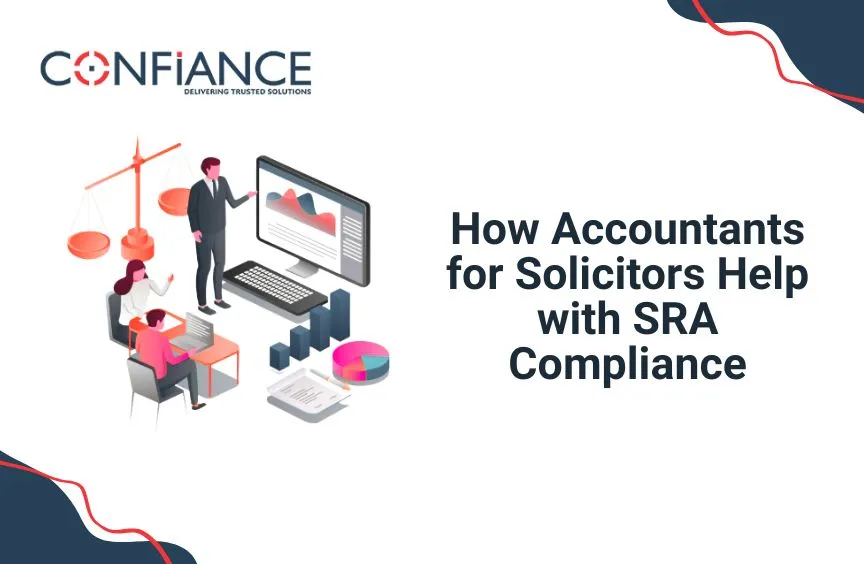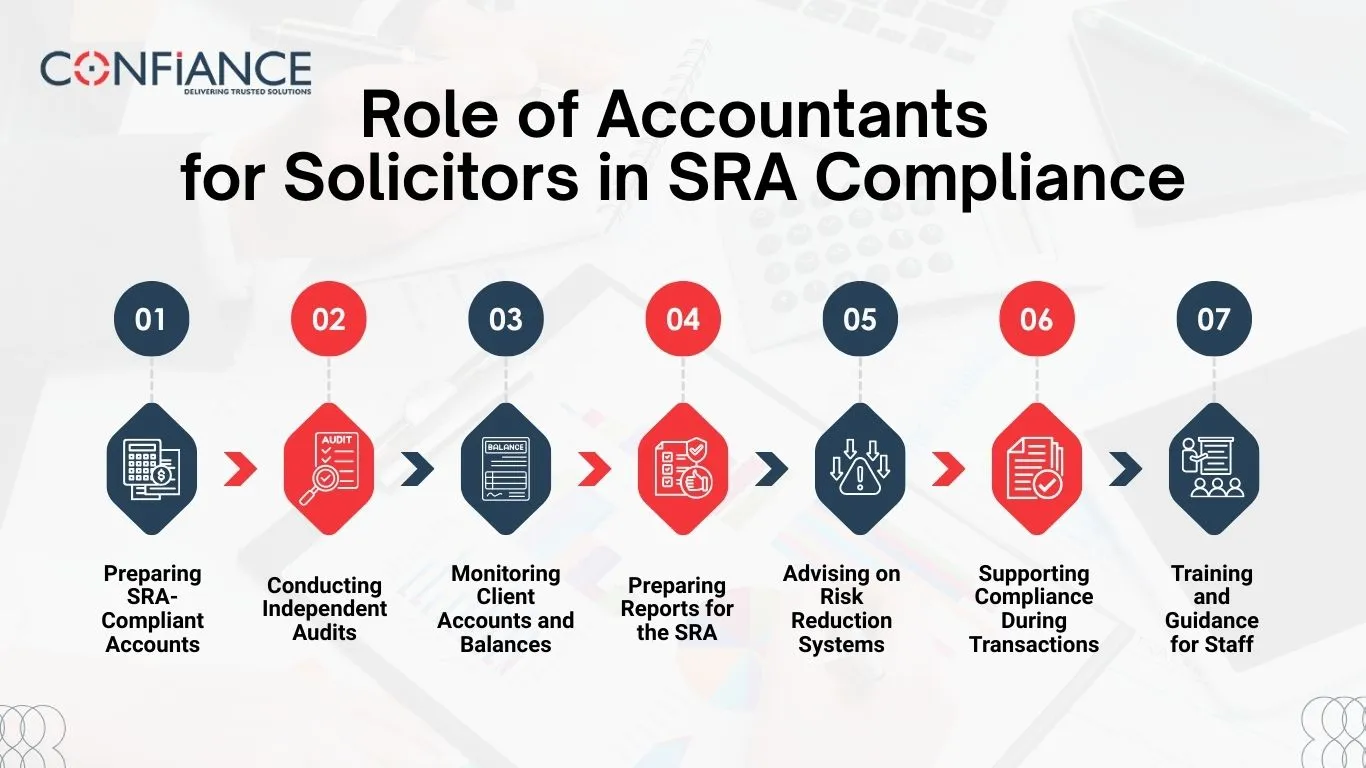
How Accountants for Solicitors Help with SRA Compliance
Running a law firm is not just about serving clients. It also means meeting strict rules set by the Solicitors Regulation Authority (SRA). Accountants for solicitors play a key role in this. They help law firms stay on top of money, client accounts, and reports. With their support, solicitors can focus more on legal work while staying safe from risks.
Why SRA Compliance Matters for Solicitors
The SRA sets rules to protect client money and to keep firms working in an ethical way. If these rules are ignored, the risks are high. Firms may face fines, audits, or even lose their licence. That is why compliance is not just a duty, but it is a core part of running a safe and trusted law firm.
Protecting Client Money
Client accounts must be handled with care. Even a small error in moving or recording funds can cause issues. Accountants for solicitors help in preventing mistakes by keeping checks in place and making sure money is always recorded in the right way.
Avoiding Penalties
Not following SRA rules can lead to legal or financial penalties. These can harm a firm’s name. Having the right accountant lowers this risk.
Role of Accountants for Solicitors in SRA Compliance
The SRA Handbook requires law firms to manage client money with strict care. Solicitors often find this area overwhelming since small errors can create big issues. Accountants for solicitors act as trusted partners, making sure all SRA rules are followed.
Their role includes:
1. Preparing SRA-Compliant Accounts
Accountants make sure all accounts follow SRA rules. They record each transaction clearly and keep client funds separate from firm money. This prevents mistakes and helps the firm stay fully compliant at all times.
2. Conducting Independent Audits
Law firms that hold client accounts must have audits on a set schedule. Accountants check the accounts on their own to spot errors or rule breaks. These audits help firms avoid fines and stay in full line with SRA rules.
3. Monitoring Client Accounts and Balances
Accountants track client funds each day, week, or month. They make sure balances match the records and warn solicitors if issues come up. This keeps client money safe and helps the firm stay compliant.

4. Preparing Reports for the SRA
When the SRA asks for reports, accountants prepare them clearly and on time. These reports show that the firm follows the rules. This builds trust with clients, regulators, and anyone who reviews the accounts.
5. Advising on Risk Reduction Systems
Accountants recommend systems and processes that reduce the chance of mistakes. This includes using software, checklists, and controls to handle client money safely.
6. Supporting Compliance During Transactions
For complex deals, like property or client fund transfers, accountants ensure every step follows SRA rules. This helps solicitors avoid breaches during high-risk transactions.
7. Training and Guidance for Staff
Some accountants provide guidance or brief training to staff handling accounts. This ensures that everyone in the firm understands SRA rules and follows them correctly.
Having accountants who understand SRA compliance means solicitors can work with peace of mind, knowing that experts are managing the financial side of the rules.
Key Financial Duties Where Accountants for Solicitors Add Value
Solicitors must manage both business accounts and client money accounts. This is where mistakes can happen, and why accountants bring real value.
1. Client Money Handling
Accountants help ensure that client funds are always kept separate from office funds. They check that transfers follow SRA rules and that records are accurate.
2. Regular Reconciliations
Monthly reconciliations are a must under SRA compliance. Accountants prepare these and ensure all balances match up. This reduces the risk of missed errors.
3. SRA Accounts Rules Audits
Law firms with client accounts often need audits. Accountants for solicitors conduct these audits and prepare the necessary accountants’ reports for the SRA.
4. Financial Reporting
From VAT returns to annual reports, accountants make sure all financial duties are accurate and on time. This avoids fines and keeps the firm on track.
5. Risk Management
By monitoring financial controls, accountants spot risks early and advise solicitors on how to fix them before they become bigger problems.
Common SRA Compliance Challenges Faced by Solicitors
Even skilled solicitors can face challenges with financial compliance. Some of the most common issues include:
- Mixing client and office money: A small slip can cause major breaches and lead to fines. Keeping accounts separate is key to avoiding trouble.
- Late reconciliations: Missing deadlines raises risks and can trigger SRA action. Regular checks help prevent errors and keep firms safe.
- Complex transactions: Large client funds, property deals, or trust accounts need extra care. Detailed checks ensure all transactions follow the rules.
- Changing rules: The SRA updates rules often. Staying up to date can be hard, but it is vital to stay compliant and avoid penalties.
- Time pressures: Busy solicitors may lack time to focus on detailed accounting work. Without time for checks, small errors can turn into big issues.
- Inadequate record keeping: Poor or incomplete records lead to mistakes and compliance failures. Keeping clear and full records protects the firm and its clients.
- Staff training gaps: Team members may not know SRA rules well, which raises the chance of errors. Regular training ensures staff follow correct procedures.
- Technology challenges: Using old or incorrect accounting tools can cause mistakes and waste time. Modern tools make reconciliation and reporting much easier.
With expert accountants for solicitors, these challenges can be reduced, saving time and stress for legal practices.
Benefits of Hiring Specialist Accountants for Solicitors
Working with accountants who understand the legal sector offers many benefits. It is not just about compliance, but it’s about growth, security, and peace of mind.
Expert knowledge of SRA rules
They know the rules inside out and ensure all accounts and reports meet SRA standards, reducing stress for solicitors.
Reduced risk of penalties
Mistakes are found and fixed early. This helps avoid fines, audits, or other costly actions from the SRA.
.
Time-saving
Solicitors can spend more time with clients instead of handling complex financial paperwork or chasing missing records.
Better financial systems
Accountants recommend tools, methods, and workflows that make accounts simpler, faster, and more reliable for the whole firm.
Support during audits
Accountants prepare records and reports needed for SRA inspections. They guide the firm through checks and make audits less stressful.
For many law firms, these benefits make accountants more like partners in success rather than just financial service providers.
Technology and Modern Tools Used by Accountants for Solicitors
Modern accountants use advanced software and tools to support solicitors. These tools improve accuracy and save time.
Some of the most common tools include:
- Cloud accounting platforms for real-time updates.
- Specialist compliance software for SRA audits.
- Secure online portals for document sharing.
- Automation tools to reduce manual errors.
By using technology, accountants for solicitors make compliance smoother and more reliable. They also give solicitors access to up-to-date financial data anytime, anywhere.
Choosing the Right Accountants for Solicitors
Not all accountants have the same skills. Picking the right one can make a big difference for a law firm. The right accountant helps firms stay compliant, safe, and efficient.
Key Qualities to Look For
When choosing an accountant, solicitors should look for these key traits:
- SRA rule knowledge: Some accountants may not know the rules well. Experts keep all accounts and client money correct and follow SRA standards.
- Experience with law firms: Accountants who know how law firms work understand the needs and risks of solicitors.
- Attention to detail: Small mistakes can cause big problems. Careful accountants help avoid fines and errors.
- Clear communication: Accountants explain rules and reports in simple, easy words.
- Use of modern tools: Digital tools, cloud software, and secure portals keep records correct and save time.
- Proactive advice: Good accountants do more than keep accounts; they guide firms to work better and avoid risks.
- Reliability and trust: Solicitors must trust their accountant to meet deadlines and keep data safe.
By picking the right accountants for solicitors, law firms can stay compliant, save time, and reduce future risks.
At Confinace, we understand the unique needs of solicitors. Our certified accountants provides tailored services specially designed to keep law firms compliant with SRA rules.
We offer:
- Regular client account audits.
- Full support with reconciliations.
- Preparation of SRA reports..
- Ongoing support to keep up with changing SRA rules.
Our goal is to give solicitors peace of mind, knowing their compliance is in expert hands. With Confinace, solicitors can focus on what they do best, serving clients, while we handle the financial compliance side.
FAQs
- What is SRA compliance for solicitors?
SRA compliance means following the rules of the Solicitors Regulation Authority. These rules show how solicitors must handle client money, keep records, and prepare accounts. Staying compliant helps firms avoid fines and build trust.
- Why do solicitors need specialist accountants?
Solicitors need accountants who know SRA rules. General accountants may miss key steps. Accountants for solicitors check client money, audits, and records to keep firms safe from errors and fines.
- How often should solicitors reconcile client accounts?
Solicitors must check client accounts at least once a month. Accountants help make sure all balances match and no mistakes happen.
- What happens if a solicitor fails SRA compliance checks?
If a solicitor fails SRA checks, the firm may get fines, extra audits, or lose approval. Expert accountants help avoid mistakes by keeping records right and on time.
- Can technology help solicitors with SRA compliance?
Yes. Cloud accounting, online portals, and compliance software make record-keeping easier. Many accountants use these tools to help solicitors stay accurate and safe.
- How do solicitors choose the right accountant?
Look for accountants who know SRA rules, have law firm experience, check details carefully, and explain things clearly. The right accountant makes compliance simple.
- What common mistakes do solicitors make in SRA compliance?
Common mistakes include mixing client and firm money, late reconciliations, poor records, and ignoring updates. Specialist accountants spot and fix these issues before they cause trouble.
